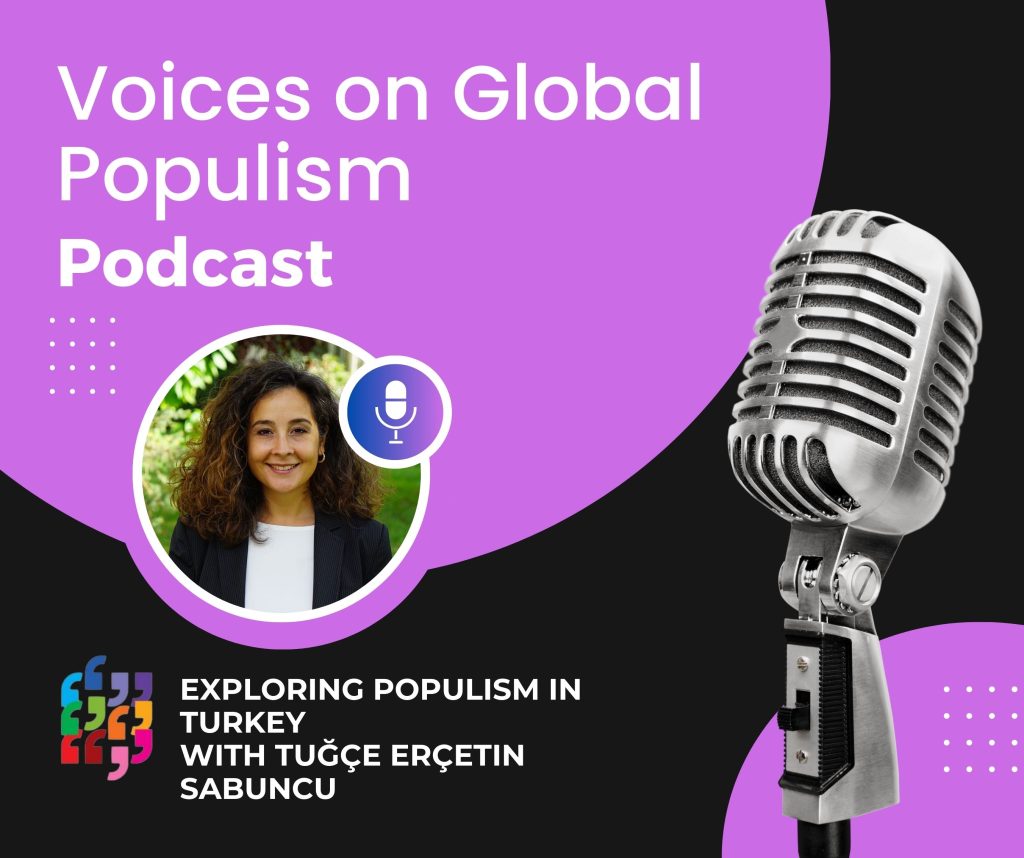How does fear shape political messaging? Why do voters turn to populist leaders in times of crisis? In the new episode of Voices on Global Populism, from Erdoğan’s populist strategies to the opposition’s populist rhetoric, Dr Ercetin Sabuncu reflects on the many faces of Turkish populism—and what it reveals about the future of democracy globally.

In the new episode of Voices on Global Populism, Begüm Zorlu sits down with Dr Tuğçe Erçetin Sabuncu to examine the evolving landscape of populism in Turkey—an insistent feature of the country that continues to shape electoral dynamics, governance, and public discourse.
Dr Erçetin Sabuncu, an Assistant Professor in the Department of International Relations at Istanbul Bilgi University, brings her extensive expertise on political communication, nationalism, othering, and comparative politics to the discussion.
The Persistence of Populism in Turkish Politics
During the episode, Dr Erçetin Sabuncu investigates the varied expressions of populism in Turkey, moving beyond the traditional focus on the ruling Justice and Development Party (AKP). While President Recep Tayyip Erdoğan has long employed nationalist, security-based, and exclusionary populist rhetoric, she highlights how opposition parties, too, have engaged in populist discourse, even though in different forms.
“Populism is often understood as something unique to the ruling party, but in Turkey, we see a political landscape where multiple actors—from the nationalist right to centre-left opposition—engage in populist strategies,” Dr Erçetin Sabuncu explains. “Whether through anti-elitism, economic grievances, or the framing of national identity, different political factions use populist narratives to mobilise support.”
Fear, Identity, and the Role of Crisis in Populist Mobilisation
One of the key themes explored in the episode is how fear and insecurity serve as powerful tools for populist leaders. Dr Erçetin Sabuncu outlines how the AKP, particularly in recent years, has leveraged a discourse of crisis—whether in response to economic instability or national security threats—to consolidate its grip on power.
“Fear does not always stem from real, tangible threats—it can also be about perceived insecurities,” she notes. “By framing political opponents, migrants, or external actors as existential dangers, populist leaders position themselves as the sole protectors of ‘the people’ against chaos and uncertainty.”
However, as the episode highlights, populist mobilisation is not limited to the ruling party. Figures in the opposition, such as Meral Akşener of the Good Party (İYİ Party), have also used nativist and economic populist rhetoric to attract voters disillusioned with the AKP’s policies. Meanwhile, opposition figures such as Ekrem İmamoğlu, the Mayor of Istanbul, have engaged in a more inclusionary form of populism, focusing on social justice and economic reform.
Can Elections Be Won Without Populism?
A particularly thought-provoking question raised by Dr Erçetin Sabuncu during the discussion is whether it is even possible to win elections in Turkey—or globally—without adopting populist rhetoric. Dr Erçetin Sabuncu suggests that in an era of political uncertainty and global crises, populism has become a dominant form of political communication.
“Rather than seeing populism as an anomaly, we need to recognise that it has become embedded in the way leaders communicate and voters respond,” she argues. “From Turkey to Europe and the United States, populist rhetoric—whether right-wing, left-wing, or centrist—has become an essential tool in electoral competition.”
Populism in a Digital Age
Another crucial factor shaping the future of populism is the role of digital media and new communication platforms. Dr Erçetin Sabuncu highlights how populist actors, both in Turkey and globally, increasingly utilise social media to spread their messages, bypassing traditional media channels.
She references Elon Musk’s recent involvement in shaping political discourse, as well as the way digital platforms amplify populist narratives, conspiracy theories, and identity-based polarisation. “Digital tools make it easier for populist leaders to communicate directly with their supporters, reinforcing their sense of identity and grievances against ‘the other,’” she explains.
What’s Next for Populism in Turkey?
With Turkey facing ongoing economic challenges, regional tensions, and political uncertainty, the conversation leaves listeners with a crucial takeaway: populism is not disappearing—it is evolving. As Dr Erçetin Sabuncu notes, understanding the mechanisms of populism is essential to comprehending modern politics—not just in Turkey, but across the world.
You can listen to the full episode of Voices on Global Populism on Spotify or Youtube.

